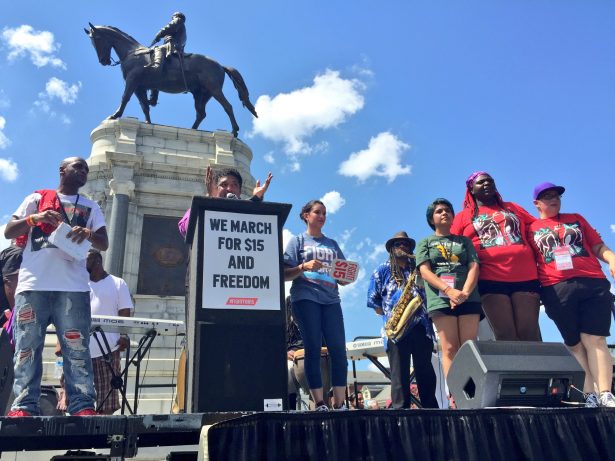
Thousands converged in Richmond, Virginia over the weekend to participate in the Fight For $15’s first-ever national convention. Central to the two-day gathering was the historic Richmond Resolution, a statement of purpose and strategy that members approved unanimously on August 13. The convention culminated on Saturday, as 8,000 people marched in sweltering heat to demonstrate their support for the resolution and their determination to see their agenda through the remainder of election season.
From the start, it was clear that organizers would emphasize the intersectionality of racial and economic justice. According to Fight for $15 national organizer Kendall Fells, the choice of Richmond for the convention underscored this framework. “We chose Richmond because it’s the onetime capital of the Confederacy,” he told the Richmond Times-Dispatch, “and we want to draw links between the way workers are treated today and the racist history of the United States.”
There was a strong showing from religious leaders, as well, who likewise saw a connection between morality and economic justice. As Rev. William Barber of Repairers of the Breach and the North Carolina NAACP noted, “If the racial, social and economic inequalities that plague our nation are all linked, so too are the fights to address them. The battle for civil rights and the battle for living wages are interconnected. These battles are moral battles.”
Organizers were eager to leverage this moral energy towards tangible goals. In its nearly-four years of operation, the campaign has grown from a New York-based collective of fast food workers to an international network representing industries from healthcare to education to retail. At the Richmond gathering, members discussed strategies to elevate their cause among political candidates. Earlier this summer, the group scored a victory when Bernie Sanders moved to include a $15 minimum wage in the Democratic National Platform, but organizers see this as one step on a long road to fair pay. With 64 million Americans still making less than $15 an hour, organizers looked to “take the next steps forward.”
By the end of the convention, Fight for $15 members and allies pledged to mount further demonstrations at upcoming presidential debates, and planned a national day of action for September 12. On that date, Fight for $15 advocates plan to demonstrate at capitol buildings around the country alongside partners from the Moral Revival Movement.
The #FightFor15 convention passed a resolution to participate in the moral revival movement this September pic.twitter.com/amAQjnVG6c
— Fight For 15 (@fightfor15) August 15, 2016
Leaving Richmond, members of the coalition appeared buoyed by the broad show of support, and eager to resume local organizing.
“I was never outspoken. But it changed with Fight for $15” Sam Santana, BK worker #FightFor15 pic.twitter.com/FezVKPYA5M
— Fight For 15 Chicago (@chifightfor15) August 14, 2016
“This year, underpaid Americans will show elected leaders in every state in America that they are a voting bloc that cannot be ignored and will not be denied,” said Service Employees International Union President Mary Kay Henry.
